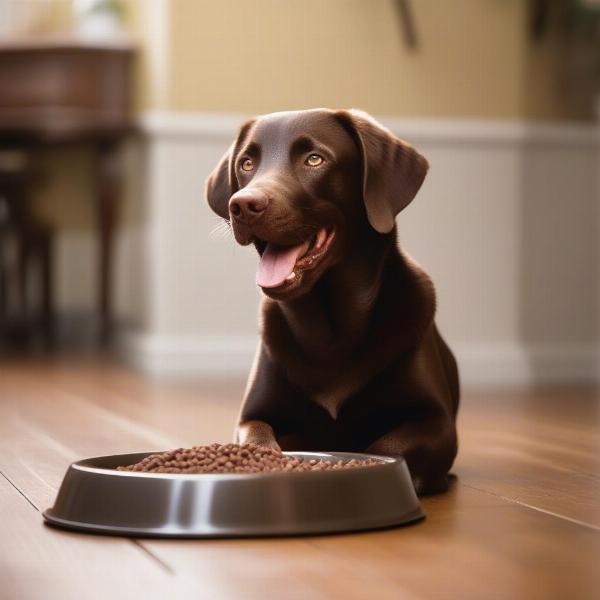Choosing the right dog food for your Labrador can feel overwhelming with so many options available. Finding a good dog food that meets your Labrador’s specific needs is crucial for their health, energy levels, and overall well-being. This article will guide you through the essential factors to consider when selecting the best food for your Lab, ensuring they get the nutrition they need to thrive.
A Labrador’s ideal diet should support their active lifestyle and help maintain a healthy weight. Look for a food formulated specifically for large breeds, with appropriate levels of protein, fat, and carbohydrates. Consider your Lab’s age, activity level, and any specific health concerns when making your choice.
Key Nutritional Needs for Labradors
Labradors are prone to certain health issues like hip dysplasia and obesity, so choosing a diet that addresses these concerns is crucial. A balanced diet rich in high-quality protein, healthy fats, and complex carbohydrates is essential.
- Protein: Supports muscle development and repair, crucial for this active breed. Look for foods with animal-based protein sources like chicken, beef, or fish.
- Fats: Provide energy and support healthy skin and coat. Opt for sources like fish oil, which is rich in omega-3 fatty acids.
- Carbohydrates: Offer sustained energy. Choose complex carbohydrates like brown rice or sweet potatoes over simple carbohydrates.
 A Labrador Retriever Enjoying Its Meal
A Labrador Retriever Enjoying Its Meal
Choosing the Right Food Type
There are various types of dog food available, each with its own pros and cons:
- Dry Kibble: Convenient, affordable, and good for dental health.
- Wet Food: More palatable for picky eaters, but less cost-effective.
- Raw Food: Requires careful preparation and monitoring to ensure nutritional balance.
- Homemade Food: Allows complete control over ingredients but demands meticulous planning and balancing.
The best choice for your Labrador will depend on your budget, lifestyle, and your dog’s preferences. For busy owners, kibble offers convenience, while wet food can be a good option for senior Labs or those with dental issues.
Reading Dog Food Labels
Don’t be intimidated by dog food labels! Learning to decipher them is key to choosing the right food for your Lab. Focus on the following:
- Guaranteed Analysis: Lists the minimum percentages of protein, fat, fiber, and moisture.
- Ingredient List: Ingredients are listed in descending order by weight. Look for high-quality animal-based protein sources at the top of the list.
- Life Stage: Choose a food formulated for your Lab’s age (puppy, adult, senior).
- AAFCO Statement: Indicates whether the food meets the Association of American Feed Control Officials’ nutritional standards.
What to Avoid in Labrador Food
Certain ingredients should be avoided in Labrador food:
- Artificial colors, flavors, and preservatives: These can cause allergies and other health problems.
- Fillers: Ingredients like corn, wheat, and soy can be difficult for Labs to digest and offer little nutritional value.
- By-products: These are low-quality ingredients that are not ideal for a healthy diet.
Addressing Specific Needs
- Puppies: Need food rich in protein and calcium for growth and development.
- Senior Dogs: May benefit from lower-calorie, higher-fiber foods to maintain a healthy weight and digestive health.
- Overweight Labs: Require a specialized diet to help them lose weight safely.
Conclusion
Choosing the right dog food is a crucial aspect of responsible Labrador ownership. By understanding your dog’s nutritional needs and learning to read dog food labels, you can make informed decisions that contribute to their long-term health and happiness. Remember to consult with your veterinarian for personalized recommendations tailored to your Labrador’s specific needs.
FAQ
- How much should I feed my Labrador? Feeding guidelines vary depending on age, activity level, and specific food. Consult your vet or the food packaging for recommendations.
- Can I give my Labrador table scraps? While occasional treats are okay, avoid feeding your Lab table scraps regularly, as they can lead to obesity and nutritional imbalances.
- What are signs of food allergies in Labradors? Common signs include itchy skin, digestive issues, and ear infections.
- Should I supplement my Labrador’s diet? Consult your vet before adding any supplements to your Labrador’s diet.
- How often should I switch my Labrador’s food? Avoid frequent food changes, as they can upset your dog’s stomach. If a change is necessary, do it gradually.
- What’s the best dog food for a Labrador puppy? Look for puppy food formulated for large breeds, rich in protein and calcium.
- Is grain-free dog food good for Labradors? Consult your vet before switching to a grain-free diet, as it may not be necessary for all Labs.
ILM Dog is your trusted source for expert advice on dog care and breeds. We specialize in providing practical and reliable information on Dog Breeds and Selection, Health and Medical Care, Training and Behaviour, Nutrition and Feeding, Grooming and Hygiene, and Products and Accessories. For personalized advice, contact us at [email protected] or +44 20-3965-8624. Visit ILM Dog for more valuable insights into caring for your furry friend.